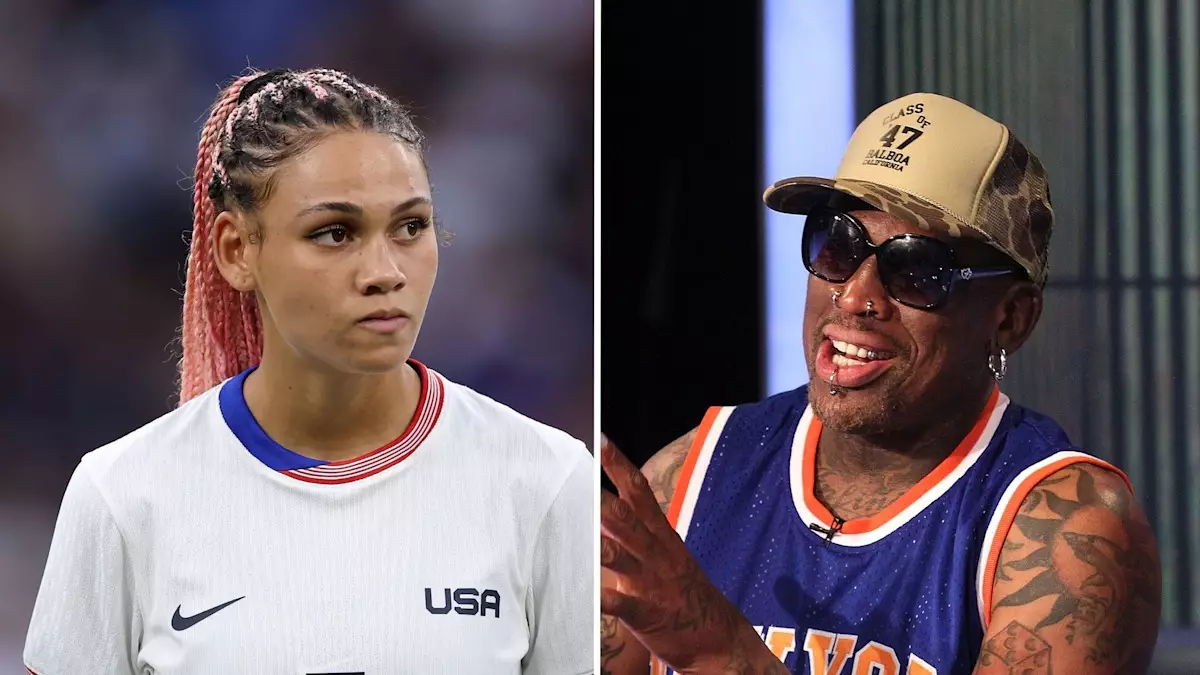Dennis Rodman, a pivotal figure in NBA history and a cultural icon known for his fearless persona on the court, has found himself embroiled in a deeply personal situation: the struggle to mend his fractured relationship with his daughter, Trinity Rodman. Recent revelations shared by Trinity highlight a tumultuous family life marked by emotional distance and contrasting public images. The evolving narrative surrounding their relationship has emerged against a backdrop of Rodman’s turbulent personal life and history with his family, presenting an intricate picture of estrangement.
Trinity recently shared poignant insights into her relationship with her father while appearing on the popular podcast “Call Her Daddy” hosted by Alex Cooper. Her reflections painted a stark portrait of Rodman as a father figure, wherein she described him as “a person” rather than a “dad.” This sentiment resonates with the struggles many children of prominent figures face; the mask of celebrity often obscures genuine emotional connections. The sheer gravity of her statements underscores the sense of abandonment she feels, asserting that their familial bond is primarily defined by biology rather than emotional closeness.
Understanding the roots of this rift necessitates a look at Rodman’s history. His first marriage to Annie Bakes in 1992 lasted a mere 82 days, despite five years of dating. Together, they share a daughter, Alexis, who has chosen a path away from the limelight, contrasting greatly with her father’s turbulent public persona. This reality sets the stage for a pattern of unstable relationships, underscored by his second marriage to model Carmen Electra in 1998, which ended in a swift annulment mere days after their Las Vegas nuptials.
Rodman’s third marriage to Michelle Moyer in 2003 appeared more promising, as it produced two children, Dennis “D.J.” Jr. and Trinity. However, their union also descended into chaos, characterized by a cycle of separation and reconciliation that ultimately culminated in divorce in 2012. The frequent breakdowns of these relationships likely fostered an environment rife with instability, leaving emotional scars on his children, particularly Trinity, who grew up amidst the discord.
The stark differences between Rodman’s public persona and his private life are evident in Trinity’s expressions of discontent regarding their financial struggles and his perceived controlling nature during her childhood. In her candid remarks, she recalls a time when her father was financially supportive, contrasting that with instances of neglect that followed their parental breakdown. Trinity noted a shift in her father’s behavior once the divorce took place, describing feelings of financial inadequacy that her family faced post-separation.
When juxtaposed against Rodman’s flamboyant public image and wealth, the ordinary struggles she faced underscore a profound disconnect between the life expected of a celebrity’s child and the reality of her experiences. Such a dissonance can often lead to emotional strain, complicating the already fragile relationship that exists between them.
In the wake of Trinity’s revelations, Dennis Rodman took to Instagram in an earnest attempt to bridge the gap between them. His heartfelt apology resonated with vulnerability as he expressed regret for not being the father Trinity desired. Rodman stated, “Sorry I wasn’t the Dad you wanted me to be but either way I still tried and I still try and never will stop.” This public declaration of intent to reconcile stands as a testament to his commitment to improving their relationship, even when faced with ongoing rejection.
Though his words carry warmth and sincerity, they also highlight the difficulties embedded in their relationship. Rodman’s aspirations for a more meaningful connection are met with the harsh reality of Trinity’s hurt, which has left her needing space from the father she perceives as a distant figure. The struggle for reconciliation between estranged family members is often complex and layered, involving deep-seated emotions, miscommunication, and a mixture of hope and skepticism.
As Dennis Rodman seeks to mend his relationship with Trinity, the path toward healing is fraught with challenges. The juxtaposition of his storied past against the unwavering hope for a better future illustrates the universal struggle of reconnecting with loved ones. For Trinity, the need for fatherly love and support stands at the forefront of her emotional needs. Meanwhile, for Rodman, the desire to redeem himself and reshape the narrative of fatherhood looms large.
The journey of Dennis Rodman and his daughter Trinity serves as a lesson in the complexities of family relationships, particularly when magnified by fame and public scrutiny. The hope for a renewed bond is tangible, but the road to reconciliation requires diligence, understanding, and heartfelt communication. Both father and daughter may find solace in the shared desire for connection, embarking on a path that might one day bridge the emotional chasm between them.
